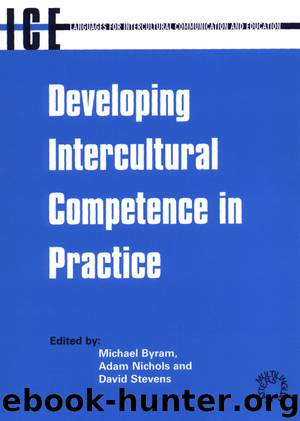Developing Intercultural Competence in Practice by Byram Prof. Michael; Nichols Adam; Stevens Dr. David

Author:Byram, Prof. Michael; Nichols, Adam; Stevens, Dr. David
Language: eng
Format: epub
Publisher: Channel View Publications
Published: 2001-06-14T16:00:00+00:00
The Study
This pedagogical case study took place in a predominantly white middle-class suburban town in the north-eastern United States. It examined the processes that ensued during ten 45-minute class periods as 23 public high school students of French IV and V college preparatory classes used the Virtual Ethnographer courseware. In essence, I hoped to do an ethnography of students as they performed virtual ethnographies.
While fourteen of the students had first-hand exposure to Francophone countries, most of them reported that their contact with the French culture was restricted to French class. By far the most commonly reported contact with France was textbooks, teachers and movies. However, six of the students had actually visited France and nine reported visiting Francophone countries. Four students mentioned they had family members who lived in France, and two students mentioned having French Canadian grandmothers whom they heard speak French. Finally, five of the students had just returned from a ten-day home stay in Chambray, France, which had been sponsored by the school and which took place during the April vacation.
The computer recorded students’ behaviours as they performed their coursework and fieldwork (e.g. sections accessed and amount of time spent in each section), responses to questions posed in the coursework section, and analyses of the video clips. Although I originally planned to be a non-participant observer, the students quickly surmised that I understood the concepts they were encountering (e.g. the ethnography of communication and human interaction) and made me an active participant by asking questions, requesting clarification, and sharing their insights with me as they worked on the program. Consequently, acting as a participant observer, I recorded observable behaviours, administered questionnaires, and performed interviews with nine purposefully selected students. The students also wrote guided introspective reports, at the beginning and end of the study, and final summary reports. The qualitative data were coded according to emergent themes. Quantitative data were analysed to establish emerging trends of behaviour. For the purposes of this chapter, I focus on the students’ perspectives, including their findings and reactions to the virtual ethnography experience.
Download
This site does not store any files on its server. We only index and link to content provided by other sites. Please contact the content providers to delete copyright contents if any and email us, we'll remove relevant links or contents immediately.
Cecilia; Or, Memoirs of an Heiress — Volume 1 by Fanny Burney(32036)
Cecilia; Or, Memoirs of an Heiress — Volume 3 by Fanny Burney(31444)
Cecilia; Or, Memoirs of an Heiress — Volume 2 by Fanny Burney(31392)
The Great Music City by Andrea Baker(30765)
We're Going to Need More Wine by Gabrielle Union(18617)
All the Missing Girls by Megan Miranda(14651)
Pimp by Iceberg Slim(13764)
Bombshells: Glamour Girls of a Lifetime by Sullivan Steve(13673)
Fifty Shades Freed by E L James(12896)
Talking to Strangers by Malcolm Gladwell(12841)
Norse Mythology by Gaiman Neil(12802)
For the Love of Europe by Rick Steves(11350)
Crazy Rich Asians by Kevin Kwan(8873)
Mindhunter: Inside the FBI's Elite Serial Crime Unit by John E. Douglas & Mark Olshaker(8679)
The Lost Art of Listening by Michael P. Nichols(7147)
Enlightenment Now: The Case for Reason, Science, Humanism, and Progress by Steven Pinker(6862)
The Four Agreements by Don Miguel Ruiz(6300)
Bad Blood by John Carreyrou(6265)
Weapons of Math Destruction by Cathy O'Neil(5810)
